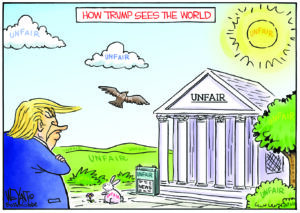What Happens When All We Have Left Is the Pentagon?
If your military is the only well-funded, well-stocked arm of the government, it’s obvious whom you’re going to turn to in any crisis. Sebastian Dooris / Public Domain
1
2
3
Sebastian Dooris / Public Domain
1
2
3
The only likely obstacle to Flynn’s ambitions to impose his twisted view of the world on Trump is the other “big league” Islamophobe in the administration, White House counselor Steve Bannon. As a recent New York Times account noted, Bannon has already attempted to outmaneuver Flynn in the battle for access to the president on foreign policy issues and his elevation to the National Security Council at the expense of the head of the Joint Chiefs of Staff and the director of national intelligence is just the latest indication of how influential he’s likely to be in shaping Trump’s foreign policy agenda. This is hardly good news, as on certain issues he may be even more extreme than Flynn, if that’s possible.
Trump’s predictably militarized approach to policymaking could have serious impacts on the domestic front as well. On his fifth day in office, for example, he threatened by tweet to “send in the Feds” to Chicago if the city government didn’t take steps to “end the carnage” there. It was unclear whether he meant federal law enforcement personnel or federal troops, a vagueness troubling in its own right. And don’t forget that his pledge to “build a wall” ensures a significant jump in funding for the further militarization of the U.S.-Mexico border, already being patrolled by unarmed drones and growing numbers of armed federal agents. After all, it took him just days after his inauguration to announce a plan to add 5,000 personnel to the Border Patrol and 10,000 agents to the Immigration and Customs Enforcement Agency.
As in all matters Trumpian, some will say we shouldn’t take him at his word, or that we should wait for his first budget proposal and other such documents to see what he’s really going to do. But the evidence is already abundant that the Trump administration is on a path toward undermining our democracy by pouring taxpayer dollars galore into the U.S. military. This will happen despite the fact that, 15 years after 9/11, that military has won nothing and settled no conflicts to Washington’s advantage, even as terror groups have spread across the Greater Middle East and Africa. It’s a decade-and-a-half-long record that should lead to almost any other set of plans than the ones the Trump administration clearly has in mind. But don’t tell them. They could care less.
Frightening as it may be, it’s important to recognize that Trump’s impulse to further militarize American society is by no means a done deal. Democrats in the Senate are in a position to stop him by voting as a bloc against any proposal to dramatically ratchet up spending on the Pentagon, which would deprive Republicans of the 60 votes they need to move forward on a spending proposal. In addition, the new president’s plans to pump up the Pentagon, dramatically slash taxes, invest in expensive new programs like the border wall, and create a trillion dollar infrastructure plan could set the stage for massive deficits that will undoubtedly unnerve constituencies ranging from fiscal conservatives to important sectors of the business community.
And keep in mind that significant numbers of military and intelligence professionals truly believe in civilian control of the military and don’t want to take on tasks unrelated to traditional military missions. In addition, Trump has already pledged to target overpriced weapons systems like the F-35 and force the Pentagon to get its books in order so it can at last pass an audit. Whether or not he follows through on these promises, he will have put them on the public agenda, reinforcing one reality: the way so much of the money currently going to the Pentagon has more to do with lining the pockets of contractors than with defending the United States and its allies.
The military-first direction in which Trump is going to take his administration will predictably lead to yet more militarized policies in the world. It’s that hammer and nail again. He should take a lesson from history by listening to the speeches of the former Supreme Allied Commander in World War II, General Dwight D. Eisenhower, a military man who also rose to the pinnacle of power in Washington. As president, Eisenhower not only spoke out against the dangers of the military-industrial complex but also stressed that America’s power is ultimately rooted in the strength of its economy and the health of its citizens, not in seeking magical military solutions or in overspending on the Pentagon. Unfortunately, Donald Trump is no Dwight D. Eisenhower.
William D. Hartung, a TomDispatch regular, is the director of the Arms and Security Project at the Center for International Policy. He is the author of Prophets of War: Lockheed Martin and the Making of the Military-Industrial Complex.
Follow TomDispatch on Twitter and join us on Facebook. Check out the newest Dispatch Book, John Feffer’s dystopian novel Splinterlands, as well as Nick Turse’s Next Time They’ll Come to Count the Dead, and Tom Engelhardt’s latest book, Shadow Government: Surveillance, Secret Wars, and a Global Security State in a Single-Superpower World.
Copyright 2017 William D. Hartung Your support matters…Independent journalism is under threat and overshadowed by heavily funded mainstream media.
You can help level the playing field. Become a member.
Your tax-deductible contribution keeps us digging beneath the headlines to give you thought-provoking, investigative reporting and analysis that unearths what's really happening- without compromise.
Give today to support our courageous, independent journalists.






You need to be a supporter to comment.
There are currently no responses to this article.
Be the first to respond.